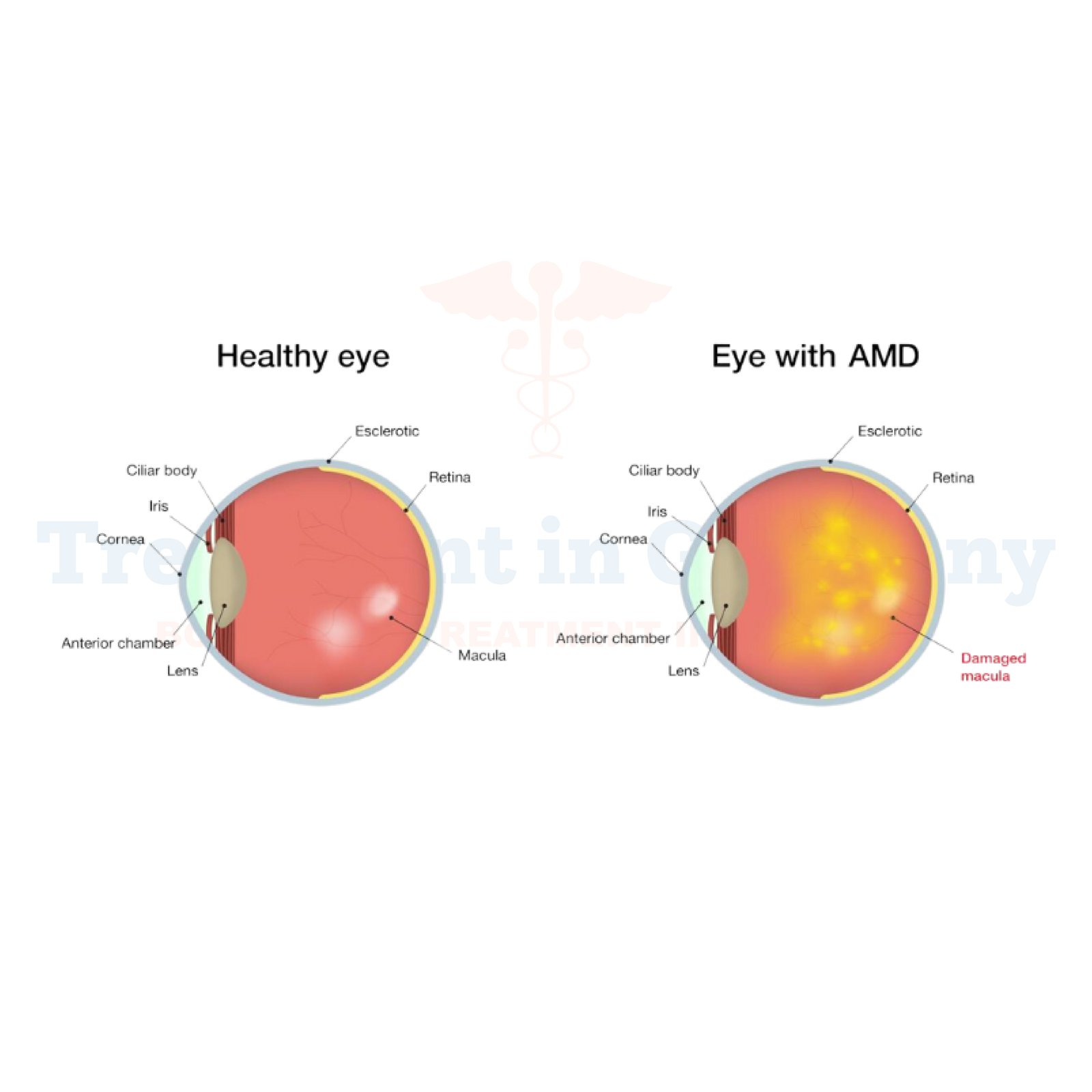In older persons, age-related macular degeneration (AMD) is the primary cause of vision loss. Losing central vision might make it more difficult to do daily tasks, even though AMD does not result in total blindness. The most prevalent type is dry macular degeneration, which results in progressive vision loss. Supplementing with nutrients may decrease the progression of the illness.
Legal blindness may result from wet macular degeneration, which can cause rapid visual loss. Treatments that could help maintain eyesight can be provided by your eye care professional. Innovative methods for successfully managing both forms of AMD are part of the treatment in Germany. Additionally, reading with glasses or a magnifying glass may help you.
AMD is a disease that affects the eye and causes progressive degeneration of the macula, which is responsible for sharp vision. Contrary to peripheral vision, which is normally preserved, the loss of central vision poses great difficulties in performing activities. Full blindness is not usually caused by AMD but it severely impairs a person’s functioning in terms of visually challenging tasks.
How Does Age-Related Macular Degeneration Affect Vision?
When the retina of the eye creates detailed images, the macula plays a role. When the macula starts to degenerate, it interferes with the optic nerve signals and the brain, leading to blurring and a change of the central vision. These impairments may become worse and take the patient to a condition of significant vision loss.
Types of Age-Related Macular Degeneration
The types of AMD are as follows:
Dry Age-Related Macular Degeneration
Dry AMD is more common and affects 90 percent of AMD sufferers. This takes place when the macula grows weak because of aging and drusen, which are small yellow deposits beneath the retina. In most cases, vision loss with dry AMD comes gradually, and in a patient, it is noticeable enough to be diagnosed before it gets worse.
Wet Age-Related Macular Degeneration
Wet AMD is less frequent yet more dangerous. This type develops when the blood vessels start to grow under the retina and macula. Such vessels are capable of rupturing and bleeding, which causes extreme and irreversible vision compromise. While the dry form o
AMD is not very severe, its wet form is a very aggressive type and needs to be dealt with at the earliest.
Risk Factors for Age-Related Macular Degeneration
Several factors lead to the development of AMD. These include:
Symptoms of Age-Related Macular Degeneration
Both wet AMD and dry AMD have the most progression; the symptoms take time to manifest themselves. Common symptoms include:
All these symptoms signal the need to get diagnosed and treated as early as possible.
Diagnosis of Age-Related Macular Degeneration
The diagnosis of AMD is as follows:
Full Eye Check-Ups
In order to control AMD, there is a great importance placed on the first signs of the disease. It is also possible to detect modifications in the retina or macula during annual eye check- ups, before their signs become apparent.
Diagnostic Tools for Age-Related Macular Degeneration
Doctors use several advanced techniques to diagnose AMD:
Possible Age-Related Macular Degeneration Treatment in Germany
Due to recent improvements in diagnostic techniques and therapy platforms that prioritize stabilization of the condition and patient quality of life, the German healthcare system is among the best at treating AMD.
Nutritional Supplements
The Age-Related Eye Disease Study (AREDS) has established that certain vitamins and minerals help to arrest the progression of the disease. Recommended supplements include:
Vitamin C
Vitamin E
Zinc
They help defend the retina against more harm and give particularly dry AMD sufferers the most value.
Anti-VEGF Injections
The standard of care for wet AMD is anti-VEGF injections. Aflibercept, ranibizumab, and bevacizumab, for instance, inhibit vascular growth factors, inhibiting the formation of new blood vessels and limiting leakage from the blood vessels in the retina. These injections are given within the vitreous with little or no pain involved.
Photodynamic Therapy (PDT)
The light-sensitive drug is mixed with PDT, and together with lasers, the treatment is used to bring death to abnormal cells found beneath the retina. One of the forms of wet ‘wet’ AMD treatment is a minimally invasive procedure.
Laser Therapy
You can attend a clinic or hospital where the laser photocoagulation treatment is used to seal leaking blood vessels. It remains one of the options when other treatments do not work for the patient.
Improving on AMD Care in Germany
The German healthcare system uses innovative solutions to approach the appropriate treatment of AMD. In the diagnosis of diseases, new technologies such as optical coherence tomography and angiography are common when assessing the advancement of diseases. Furthermore, German clinics tend to use the newest anti-VEGF medications for therapy as well as customized treatment for the highest outcome.
Emotional Challenges
AMD-related vision loss results in anxiety, depression, or any other emotional disturbances. It informs the people that support groups, counseling, and psychological therapy can help them in their difficult times.
Frequently Asked Questions
What factors make Germany the preferred setting for the treatment of AMD?
Germany provides diagnostics and immunotherapies, highly effective and differentiated anti-VEGF treatment, and unique imaging systems.
Is it possible to reject the dangers of AMD by changing your diet?
Indeed, smoking cessation, controlling some health hazards such as hypertension, etc., can lower the risks of AMD.
How is AMD diagnosed early?
AMD is diagnosed through an eye examination and other tests, which include fluorescein angiography.
Is it true that AMD results in total loss of vision?
There is no such thing as blindness with AMD, but central vision is always impaired while peripheral vision is okay.
Does administering anti-VEGF injections trigger any pain?
No, these injections are given with a fine needle, so there is a sensation of a painless treatment.
👉 Contact us for further information and receive a complimentary consultation.


.webp)
 (1).webp)

.webp)
 (1).webp)


.webp)
 (1).webp)

.webp)
 (1).webp)
